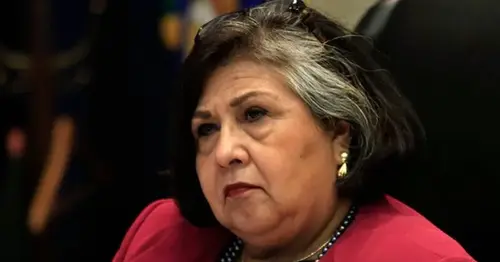
Gloria Molina announces she has terminal cancer
Gloria Molina, 74, made history when she became the first Latina to be elected to the California State Assembly, the Los Angeles City Council and the L.A. County Board of Supervisors.
Now, Californians, especially Latinos, are touting the lasting impact of Molina's political activism after she announced in a Facebook post Tuesday that she has terminal cancer that has turned "very aggressive" three years after the diagnosis.
Molina, who wrote that she's lived a "long, fulfilling and beautiful life," is being recognized for her longstanding battle to improve conditions for residents, especially in Latino neighborhoods.
“I grew up in East L.A. — she was always this mythical figure,” said political scientist Stephen Nuño, a professor at Northern Arizona University.
“She was so politically savvy — she had this smile and was very approachable, but when you dealt with her, she could be ruthless,” he said.
Molina’s legislative achievements are especially significant considering she grew up in politics in the 1970s and 1980s, when even within the Latino community there was a mentality that women weren’t good at politics, said Nuño, who is also an analyst for the polling firm BSP Research.
While attending college, Molina became involved in the Chicano movement, which advocated for Mexican American empowerment and activism. She started the Nurse Mentoring Program to address the nation's shortage of nurses by partnering with local community colleges to boost nursing students.
She advocated for women’s health and was instrumental in a lawsuit filed by Mexican American women who were deceived into involuntary sterilizations at the L.A. County-USC Medical Center.
Molina is arguably most well-known for her tenure as the first Latina on the L.A. County Board of Supervisors, representing the 1st District for 23 years.
She helped develop parkland in the inner cities, including L.A. River Center and the El Bosque de Rio Hondo; assisted in obtaining $1 billion in federal aid for the county's public health system and oversaw maintenance of quality-of-life issues for the county's residents living in unincorporated areas.
After the 1994 Northridge earthquake, the L.A. County-USC Medical Center needed to be rebuilt and Molina accused three white supervisors of racism after her colleagues wanted to scale down the facilites.
As a state lawmaker and through her involvement in the Mothers of East Los Angeles, she helped prevent a proposal to build a state prison near schools and neighborhoods in East L.A., a predominately Latino neighborhood.
“She is one of the most impactful Angelenos in the history of the city,” said Michele Siqueiros, a civil leader and president at the Campaign for College Opportunity, a group working toward expanding college access for California’s students.
Molina was pivotal in building up La Plaza de Cultura y Artes, a Mexican American museum and cultural center in L.A., according to Siqueiros. She added that in a white and male-dominated space, Molina put Latino interests first and uplifted women by shattering glass ceilings.
"She demonstrated that fighting for justice and equity in our communities can be done in in many ways, and she often fought against leaders in our own community that didn't support her...Her impact has gone far and wide beyond Los Angeles,” Siquerios said.
In her Facebook post, Molina said she’s “grateful for everyone in my life and proud of my family, career, mi gente (my people) and the work we did on behalf of our community.”
LA Times columnist Gustavo Arellano wrote a column proudly calling Molina a “chingona” — Mexican slang that loosely translates to badass.
It's the right word to describe her, said Nuño.
Source: https://www.nbcnews.com/news/latino/gloria-molina-announces-terminal-cancer-rcna75129






